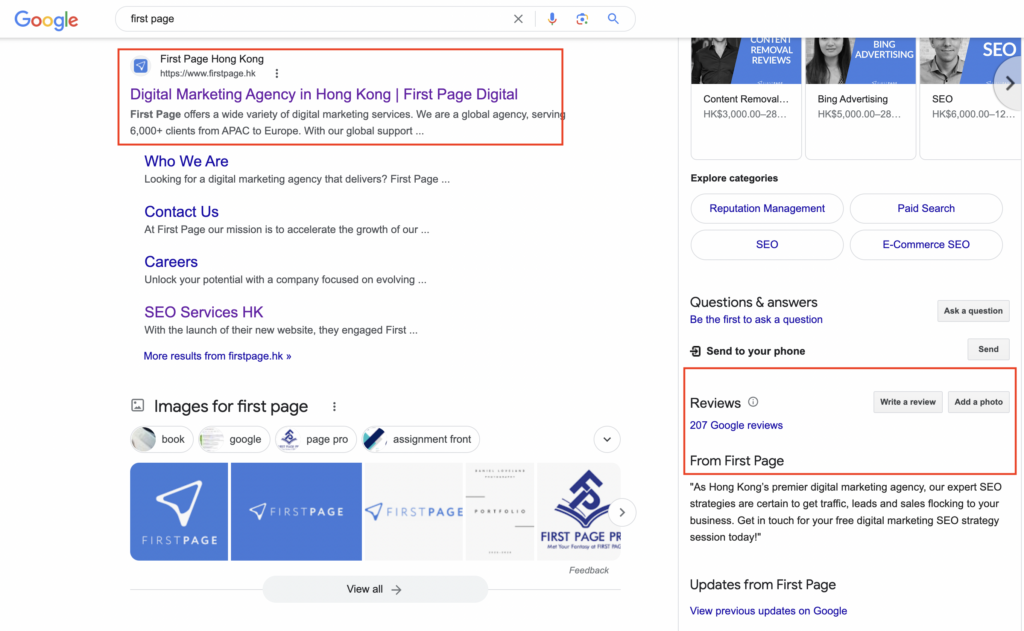Online Reputation Management (ORM) involves using various strategies to build, maintain, and improve their reputation online, while also minimizing the impact of negative content or reviews. ORM services includes activities such as monitoring social media, responding to customer feedback, generating positive content, and using SEO techniques to improve search engine results. The ultimate goal of ORM is to present a positive and accurate image of the person or organization online.
Table of contents
- Why Is Online Reputation Management Important?
- Key Places that Influences Reputation
- What Is The Difference Between Reputation Management & PR?
- Online Reputation Management Failed Examples
- How to do online reputation management?
- What is the relationship between ORM & SEO?
- Final thoughts
- What other marketing tactics can you use to beat your competition?
Why Is Online Reputation Management Important?
Online Reputation Management (ORM) is important because it can directly impact a person’s or organization’s reputation, credibility, and ultimately, their success. In today’s digital age, the internet is often the first place people go to learn about a person or business, and negative information can spread quickly and widely. A negative online reputation can harm a person’s job prospects, a business’s sales and revenue, and even lead to legal issues. In fact, almost 60% of U.S. consumers said they would avoid buying from a brand that comes across as untrustworthy.
ORM helps to build a positive online reputation by highlighting the strengths and achievements of a person or organization, and addressing any negative feedback or reviews. By proactively managing their online presence, individuals and businesses can control the narrative about them online, build trust with their audience, and protect their reputation from potential harm.

For corporates or well-known individuals, Reputation Management should be one of the pillars of your digital marketing strategy.
Key Places that Influences Reputation
Although the specific blend of strategies may vary, ORM generally entails utilizing a combination of the following tactics:
Search Engine Results
The initial page of search engine results is crucial in shaping the initial perception of your brand. Negative content appearing on this page can result in people losing faith in your brand. Search engines such as Google, Bing, Yahoo, Amazon, YouTube, and others play a vital role in forming these first impressions.
Reviews & Ratings
On popular review platforms like Yelp, Trip Advisor, Amazon, and the Better Business Bureau, what kind of feedback is being shared about your brand?
Social Media
Social media posts have the power to influence the buying decisions of 78% of consumers. Thus, it is essential to monitor any comments or posts related to your brand on social media. Although social media has a shorter lifespan than search results, it still significantly shapes people’s perceptions of your brand.
Wikipedia
Wikipedia is an incredibly influential player in search engine results, appearing on Google’s first page more than 50% of the time and ranking for nearly all search queries. While it is generally regarded as a reliable source of factual information, it is also highly susceptible to vandalism.
Knowledge Panel
Although it is a component of search results, the Google Knowledge Panel is so crucial that we deemed it necessary to mention separately. Google automatically generates this information box, which appears at the top of the first search results page. This snapshot of information is often the initial piece of content that individuals read when researching your brand, underscoring the necessity of ensuring that it reflects positively on your brand.
What Is The Difference Between Reputation Management & PR?
Reputation Management (RM) and Public Relations (PR) are two related but distinct areas of expertise.
Reputation Management focuses primarily on managing and maintaining a person’s or organization’s reputation in the online space. It involves monitoring and responding to feedback from customers, addressing negative comments or reviews, and building a positive online presence through various tactics such as SEO, content creation, and social media management.
Public Relations, on the other hand, is a broader field that involves managing a company’s relationship with the public, media, and other stakeholders. PR professionals work to promote a positive image of the company through various channels, including press releases, media relations, events, and promotions.
While both Reputation Management and Public Relations are concerned with managing an organization’s reputation, RM is primarily focused on the online space, while PR is more focused on building relationships with stakeholders and promoting a positive image of the company through various channels.
Online Reputation Management Failed Examples
QANTAS A380 INCIDENT
The plane encountered an engine issue shortly after takeoff and promptly returned to Singapore. Fire crews were present on the runway due to reports of smoke emanating from the engine, as depicted in footage from the BBC. Qantas has taken all six of its A380s out of commission while a thorough investigation takes place.
However, the fast-paced nature of the 24/7 news cycle and the prevalence of social media added to the confusion and fear experienced by friends and family of the passengers in the immediate aftermath of the incident.

Finally, the airline and ground officials coordinated their efforts and issued a statement on the company’s website.
However, in a world where news often originates or spreads rapidly through social media, Qantas may have been perceived as slow to respond.
United Airlines
Following the release of a viral video depicting a passenger being forcibly removed from an overbooked flight, United Airlines suffered a market value loss exceeding $1 billion.
Within a single day, the video garnered over 1 million online mentions and was viewed over 100 million times. Numerous viewers condemned the CEO’s perceived inaction during a public perception crisis.
Although this incident took place in 2017, it continues to be referenced frequently in discussions surrounding Online Reputation Management (ORM) to this day.
Taiwan McDonald’s
In 2015, Taiwan McDonald’s launched its “60-second Express” promotion, which promises ultra-fast service. However, this campaign has been heavily criticized by many netizens, who claim that it puts too much pressure on employees and could lead to exhaustion. Some anonymous employees have even spoken out, stating, “Don’t treat us like dogs!” Others have launched a movement demanding that McDonald’s stop the “60-second Express” campaign.
The failure to address the negative comments on the internet ultimately led to the early demise of the
“60-second Express”.

Keyword research helps you uncover what your target audience is looking for.

How to do online reputation management?
By implementing a comprehensive online marketing strategy and adhering to effective ORM practices, it is entirely possible to create an online reputation that exudes credibility, authenticity, and dependability.
1. Tracking and Monitoring
Prior to launching an online reputation campaign, it is crucial to understand the current perception of you or your brand. To begin this process, it is recommended that you identify relevant keywords that are associated with your name, brand, or company and use them to track online mentions.

Various tools are available for online reputation management, allowing you to monitor and track brand mentions. Some examples include:
- Social Mention – socialmention.com
- Google Alerts – google.com/alerts
- TweetBeep – tweetbeep.com
- Technorati – technorati.com
- BlogPulse – blogpulse.com
- TagBulb – tagbulb.com
2. Form a Strategy
After completing the tracking phase, it is important to develop a strategy for addressing negative reviews. Various strategies can be employed depending on the severity of the situation and desired outcomes.
A few of our First Page common strategies for our clients include:
- Developing a Wikipedia page
- Requesting that webmasters replace negative content with positive content
- Improving reviews and ratings
- Creating a new website with a person’s name
- Promoting positive results with SEO
- Posting content on high-authority third-party websites
- Regularly posting on social media.
3. Content Creation
Content creation is a crucial aspect of any online reputation campaign. To create an effective content marketing strategy, it is important to determine where, what, and how often to post online.
A typical multi-step content development strategy may include:
- Brainstorming content ideas
- Developing headlines
- Creating primary and secondary content
- Approving and editing content
- Negotiating placement with publishers
- Placing content
- Promoting content on social media and search engines
- Improving online reviews and ratings.
4. Promotion
To promote the content that has been created, it is necessary to target the intended audience. Web promotion can take various forms, including:
- Influencer outreach
- SEO
- Negotiating with bloggers
- Promoting on social media
- Placing sponsored content on high-authority media websites.
If you adhere to these tips consistently, you are likely to experience little difficulty in improving or rebuilding your online reputation. The advantages of online reputation management are numerous, and it ultimately depends on how you choose to proceed.

Want more sales? Want more leads?
See how First Page can drive insane sales. See real results from your SEO campaign! Contact us!
What is the relationship between ORM & SEO?
As customers increasingly rely on search engines for product and service research, it is crucial to prioritize ensuring that the most positive and favorable results appear first when searching for your brand. This is a fundamental aspect of any ORM strategy since the top search results heavily influence how people perceive your brand.
Taking ownership of the message being presented to your audience is essential, which is why it is crucial to be in control of those results as much as possible. ORM is a multi-channel approach that aims to prevent and resolve any issues that could potentially harm your brand’s reputation.
A successful SEO strategy should achieve the following reputation management objectives:
- Optimize website pages to rank highly in search engine results pages (SERPs) for targeted keywords and phrases.
- Showcase authentic social media profiles that represent your brand or company.
- Optimize company-hosted and third-party review pages to appear when someone searches for “your brand name + reviews.”
- Influence search engines to prioritize positive content while simultaneously pushing down negative or irrelevant content beyond the third or fourth page.
Like to learn more about well-crafted headlines for your ads?
We have a great blog post you can read to learn more fast!

Final thoughts
At First Page, we provide professional Online Reputation Management Services. These services can help you improve your reputation online.
If you want a more in-depth understanding of which reputation management strategies to employ, contact our digital strategists at First Page here.

Ready to reach page one on Google?
We know you want to make real money! Get ready to convert customers like crazy. Please do not delay. Contact us today!
Unsure of getting in touch? We don’t bite! If you’d prefer, we invite you to learn more about our SEO services. Don’t delay, get ahead of the competition now!
What other marketing tactics can you use to beat your competition?
Here are some helpful marketing tactic blogs that can help you break all your past sales records, and your competition in the process:
- What Is SEO?
- What is Amazon PPC?
- Social Media Strategies: Successful Ones You Can Learn From
- Helpful Content Tips: Get Noticed Before The Competition
- 6 Easy Digital Marketing Hacks To Increase Your Leads
Are you a busy business owner? You may not have the time to run the marketing tactics you need to make money regularly. If this is the case, we encourage you to review some of our strategic marketing services to drive more sales:
- SEO for your business to drive qualified leads
- Social media management for improved brand awareness
- Linkbuilding to drive organic traffic to your website
- Top converting landing pages to convert your leads
- Email marketing campaigns to bring in referrals





















